In India, a residential certificate is a highly crucial document, which a person requires in various states to avail of a variety of services. One is expected to submit a residential certificate almost everywhere, from educational institutes to workplaces and from banks to authorities issuing government subsidies. In fact, common service centers that help you apply for identification and other documentary proofs will also ask you to show your residential certificate.
What is a residential certificate?
A residential certificate is a document issued by government authorities in India to testify that an individual resides at a certain address. As one’s residence is a major factor to apply for government subsidies, government jobs, educational institutes and identity documents, residence proof is a very important document.
Who issues a residential certificate?
Residential certificates in India are issued by the state governments through local authorities. Residents of a village can apply for a residential certificate at the Tehsildar’s office. In cities, the responsibility to issue this document lies with the municipal bodies of the area.
Who can apply for a residential certificate?
An individual who is a citizen of India and residing continuously for the last three years in the area can apply for it.
Documents needed to apply for residential certificate
To apply for residence proof, an applicant must provide identity proof as well as the proof for continuous residence at the given address. The following documents are accepted as the proof of identity and continuous residence:
Identity proof
- Aadhaar card
- PAN card
- Ration card with photo
- Voter ID card
- Passport
- Driving license
- Any government-recognized document
Proof of continuous residence
- Aadhaar card
- Voter ID card
- Driving license
- Passport
- Ration card
- Registered rent agreement
- Bank passbook
- Electricity bill
- Water bill
- Telephone bill (landline or post-paid)
- Gas bill
- Educational certificate
- A government-recognized document
Other documents/details
- Passport size photo
- Original self-declaration form
- Duly signed copies of self-declaration form
- Contact number and a copy of identity card of the Class-I gazetted officer who has attested the form
See also: What is a birth and death certificate, and when are they issued?
Who issues domicile certificate? What is the processing fee?
Depending on the state where you are applying, you will have to contact the following authorities to get a domicile/residence certificate:
State-wise list of domicile certificate issuing authority, processing fee
| State | Authority | Processing time | Application fee |
| Andhra Pradesh | Revenue officer | 7 days | Rs 10-35 |
| Arunachal Pradesh | Tehsildar | NA | NA |
| Assam | Circle officer | 14 | NA |
| Bihar | Circle officer | 15 | NA |
| Chhattisgarh | Sub-divisional magistrate/tehsildar’s office/revenue department/district collector’s office | 15 | Rs 30 |
| Goa | Deputy collector | 5 | NA |
| Haryana | Sub-divisional magistrate | 7 | Rs 30 |
| Himachal Pradesh | Tehsildar | 15 | NA |
| Jharkhand | Tehsildar | 15 | NA |
| Karnataka | Tehsildar | 7 | Rs 25 |
| Kerala | Tehsildar | 5-Jan | Rs 28 |
| Madhya Pradesh | Circle officer | 15 | NA |
| Maharashtra | Circle officer | 15 | NA |
| Manipur | Circle officer | 15 | NA |
| Meghalaya | Deputy commissioner | 15 | NA |
| Mizoram | Deputy commissioner | 2 to 3 | NA |
| Nagaland | DM | 10 to 15 | NA |
| Odisha | Tehsildar | 15 | NA |
| Punjab | Tehsildar | 15 | NA |
| Rajasthan | Tehsildar | 15 | Rs 40 |
| Sikkim | Tehsildar | 15 | NA |
| Tamil Nadu | SDM | NA | Rs 60 |
| Telangana | Tehsildar | 7 | Rs 10 |
| Tripura | SDM | 15 | Rs 5 |
| UP | Destrict magistrate | 15 | Rs 10 |
| Uttarakhand | Tehsildar | 15 | NA |
| West Bengal | Destrict magistrate | 3 | None |
| Union Territories | |||
| Andaman and Nicobar Islands | Tehsildar | 10 | Rs 2 |
| Chandigarh | Deputy commissioner | 15 | NA |
| Daman and Diu | Mamlatdar office/collector office | 7 days | NA |
| Delhi | Deputy Commissioner/ Sub-District Magistrate/ Sub-Divisional Magistrate | 14 | NA |
| Jammu and Kashmir | Circle officer | 15 | NA |
| Ladakh | Revenue Officer | NA | NA |
| Lakshadweep | Deputy collector | NA | NA |
| Puducherry | Sub-registrar | NA | NA |
How to apply for a residential certificate?
One can apply for this document offline as well as online. However, the facility to apply for this certificate is not available in every state.
How to apply for a residential certificate in-person?
Step 1: To apply for a residential certificate in-person, you will have to visit the Tehsildar’s office if you live in a village. Residents of cities can approach the municipal office.
Step 2: Fill in the application form.
Step 3: Attach all the necessary documents, along with a duly signatured self-declaration form with the application form.
Step 4: Submit the application form along with the required fees.
Step 5: The Tehsildar/municipal office will verify the documents, post which it will issue the certificate.
How to apply for a residential certificate online?
In states, where the facility to apply for a residential certificate is available online you can do it from your home. While the process to apply for it might be the same, there is likely to be minor difference in the procedure, depending on the state you are applying. To provide clarity to our readers, we will explain the online process here to apply for a domicile certificate in Delhi.
Step 1: Visit the official website: https://edistrict.delhigovt.nic.in/
Step 2: You will be asked to register first before applying for the certificate. To register, you will have to provide the following details:
- Aadhaar number
- Name
- Date of birth
- Father’s name
- Mother’s name
- Mobile number
- E-mail ID
Step 3: Registered users can log in using their user ID and password. Fill in the captcha before logging in.
Step 4: On the home page, you will get an option to apply for a service. Click on it.
Step 5: From the list of services available for applying, click on ‘Domicile Certificate’. You will get an option after scrolling down a little.
Step 6: Now provide basic personal and residence details to proceed.
Step 7: Once that is done, you can proceed with uploading the necessary identity and address proof documents along with your passport size image and a self-declaration form.
Step 8: Once all documents are attached, you will be asked to verify all details before the final submission.
Step 9: An acknowledgement receipt will be generated, with your application number.
Step 10: You will now have to appear in the office of the certificate counter of the sub-division for verification on any working day between 10 AM and 1 PM. Carry original documents for verification.
Self-declaration form to apply for residence certificate
I ________________________________________S/o/D/o Sh._______________________________
aged _______________R/o____________________________________________________________
Verify as Under:
- That the above contents are correct to the best of my knowledge and belief, and nothing has been concealed therein.
I further affirm that:
- I am aware that in case the information furnished above is found to be incorrect, I shall be liable for prosecution under Section 177 & 191 of the Indian Penal Code, which stipulates as under: –
- Furnishing False Information- whoever, being legally bound to furnish information on any subject to any public servant, as such, furnishes, as true, information on the subject which he knows or has a reason to believe to be false, shall be punished with simple imprisonment for a term which may extend to six months, or fine which may extend to one thousand rupees, or with both;
Or, if the information which he is legally bound to give respects the commission of an offence or is required for the purpose of preventing the commission of an offence, or in order to the apprehension of an offender, with imprisonment of either description for a term which may extend to two years, or with fine, or with both.
- Giving false evidence – whoever being legally bound by an oath or by an express provision of law to state the truth, or being bound by law to make a declaration upon any subject, makes any statement which is false, and which he either knows or believes to be false or does not believe to be true, is said to give false evidence.
III. Providing any false evidence shall be punishable under section 193 of IPC, 1860 which provides imprisonment for a term up to three years and fine.
Date:
Signature of Beneficiary:
Place: ______________________ (Parents Signature in case of Minor)
Can a minor apply for a residence certificate?
In case of a minor, his/her parents can apply for a residence certificate under the provisions of the Indian Majority Act, 1875. In this case, the address proof of the parents should be attached with the application while the ID proof should be of the minor. Parents applying offline will have to submit self-attested copies of the original documents at the Citizen Service Centre (CSC). While applying online, these documents can be uploaded but their physical verification may be necessary at the counter even in case of online applications.
Residence certificate application format
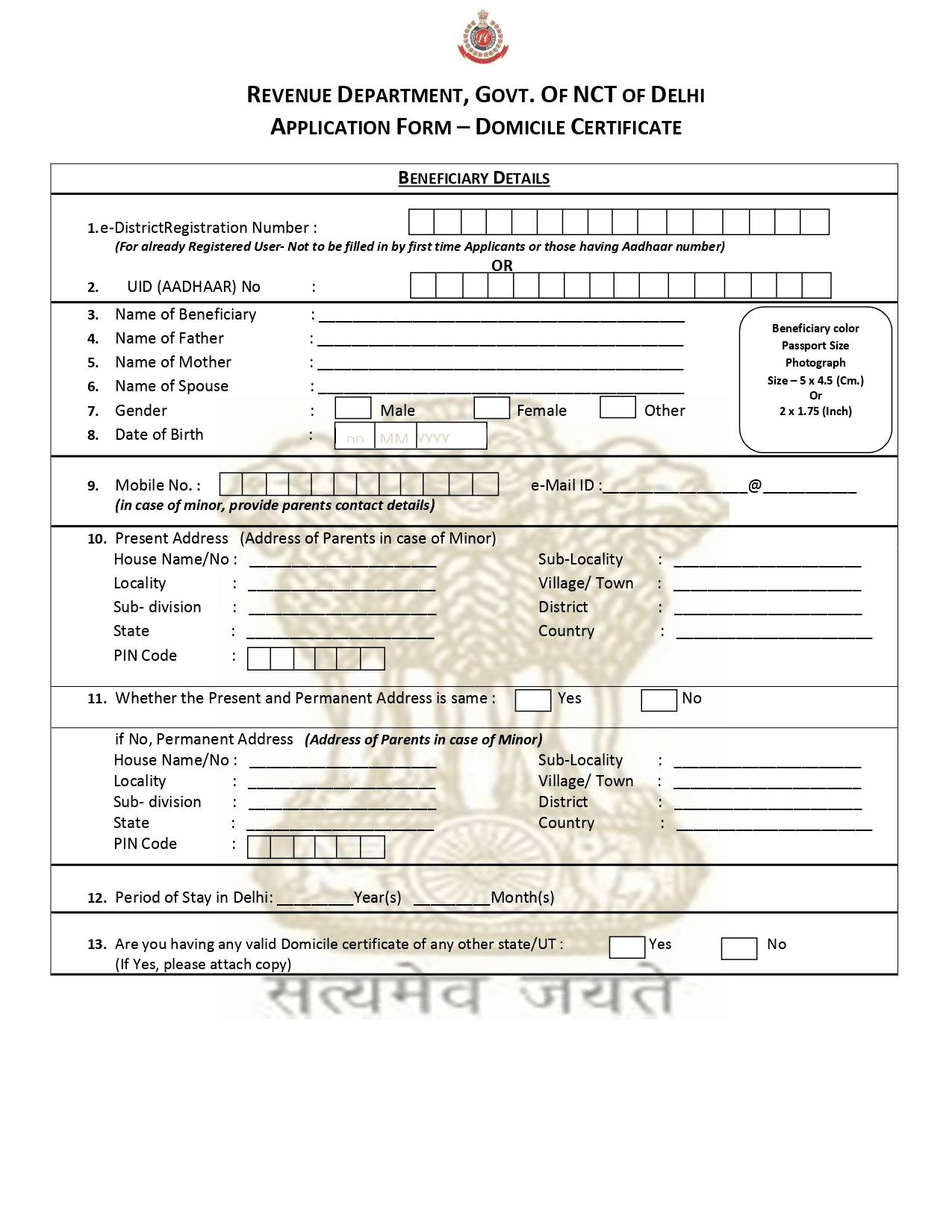
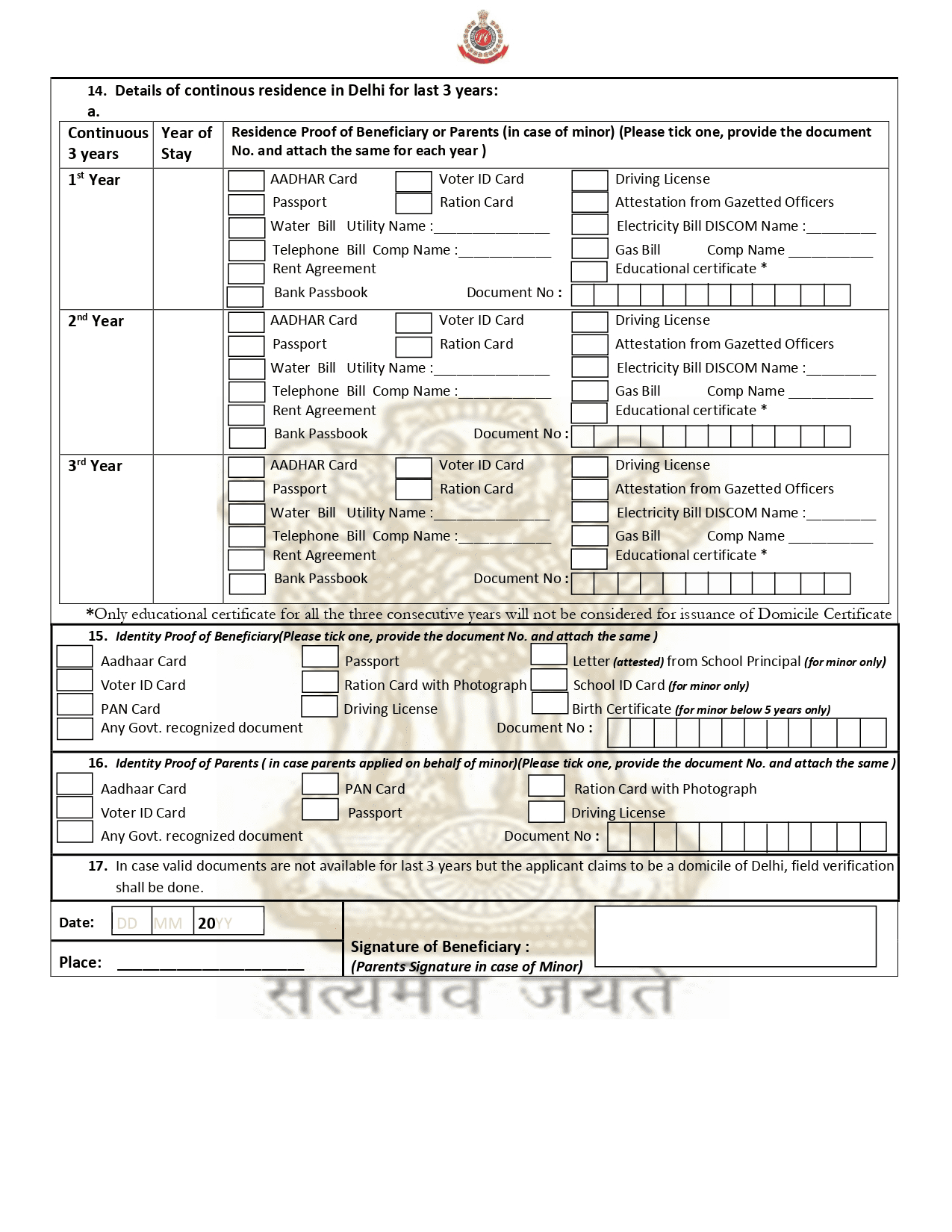
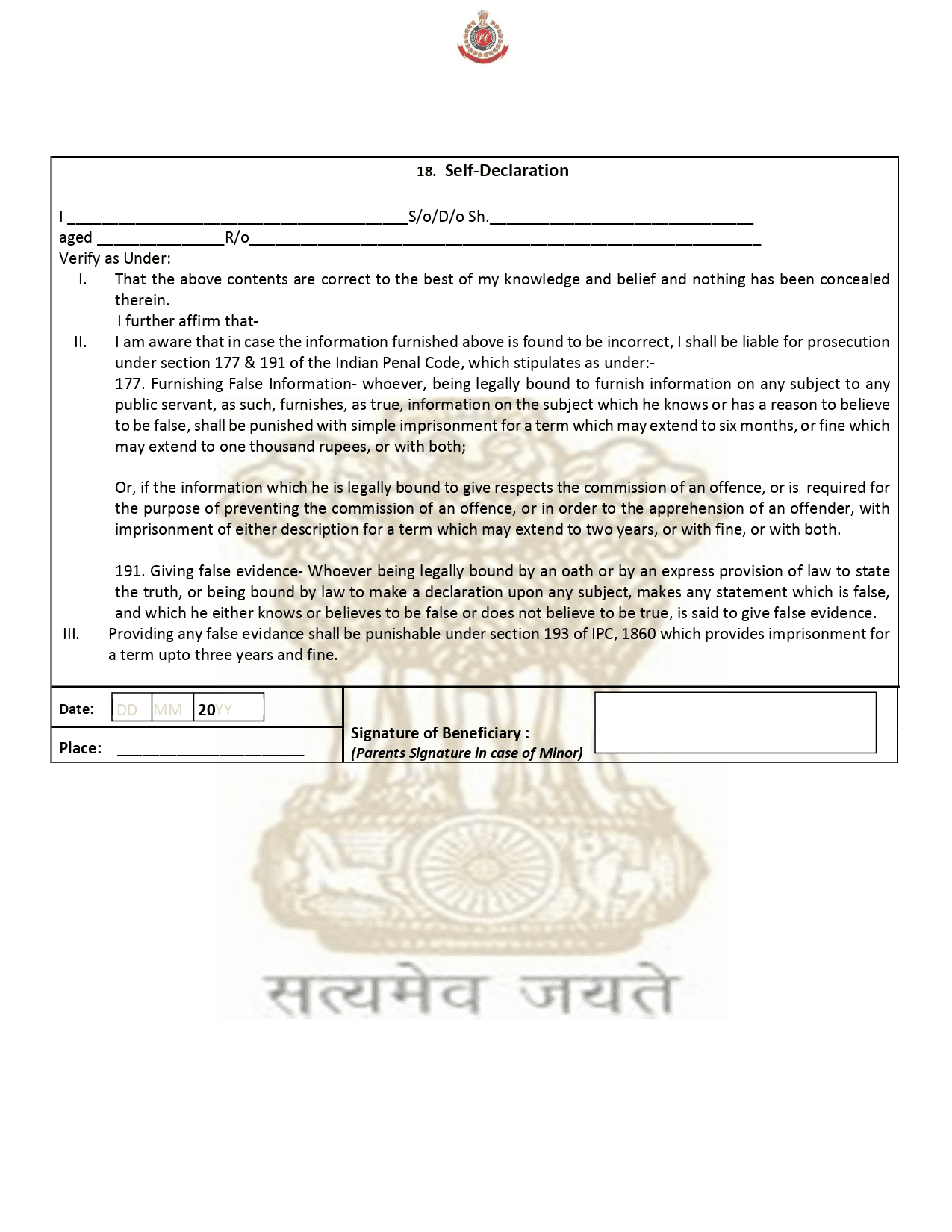
Residence certificate application sample in Hindi
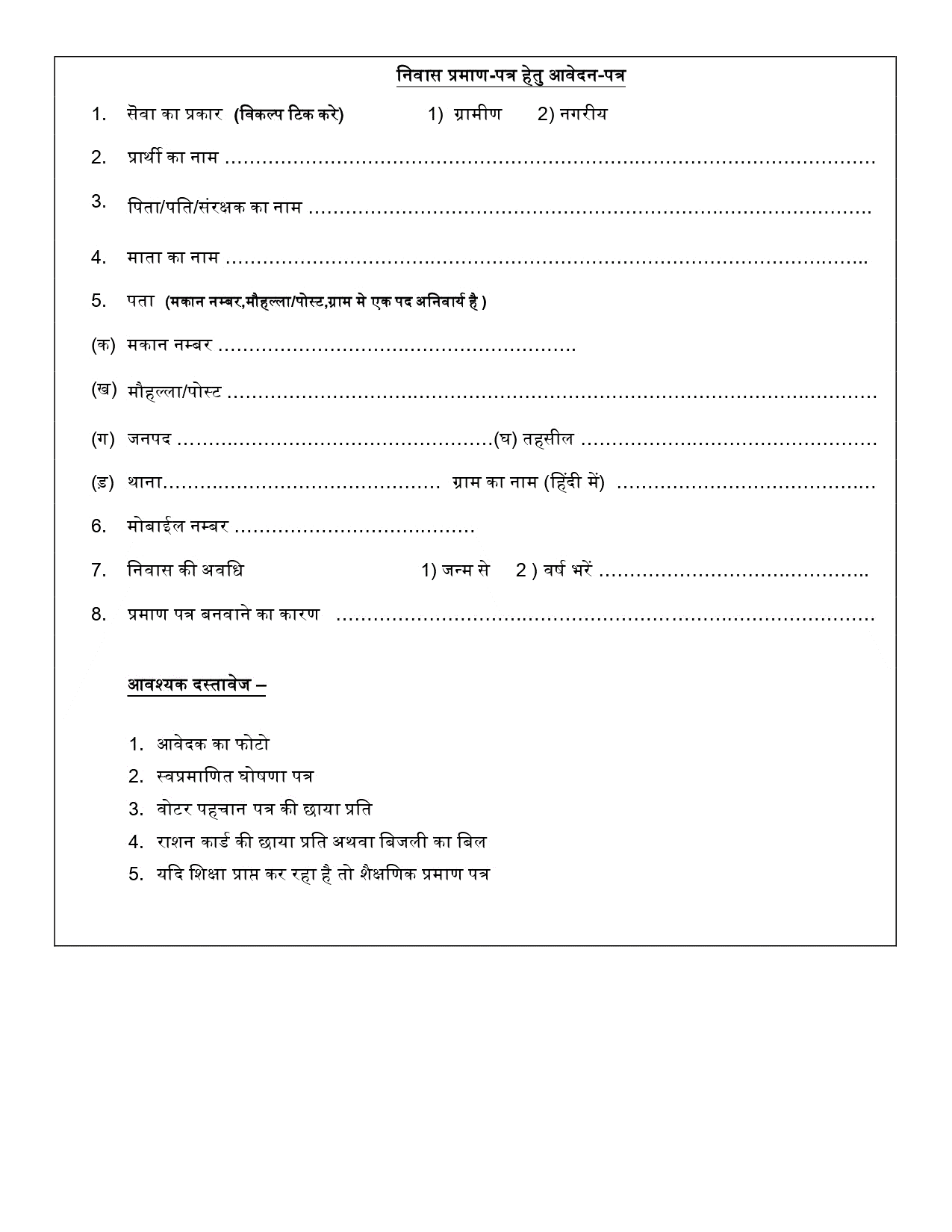
Residence certificate sample
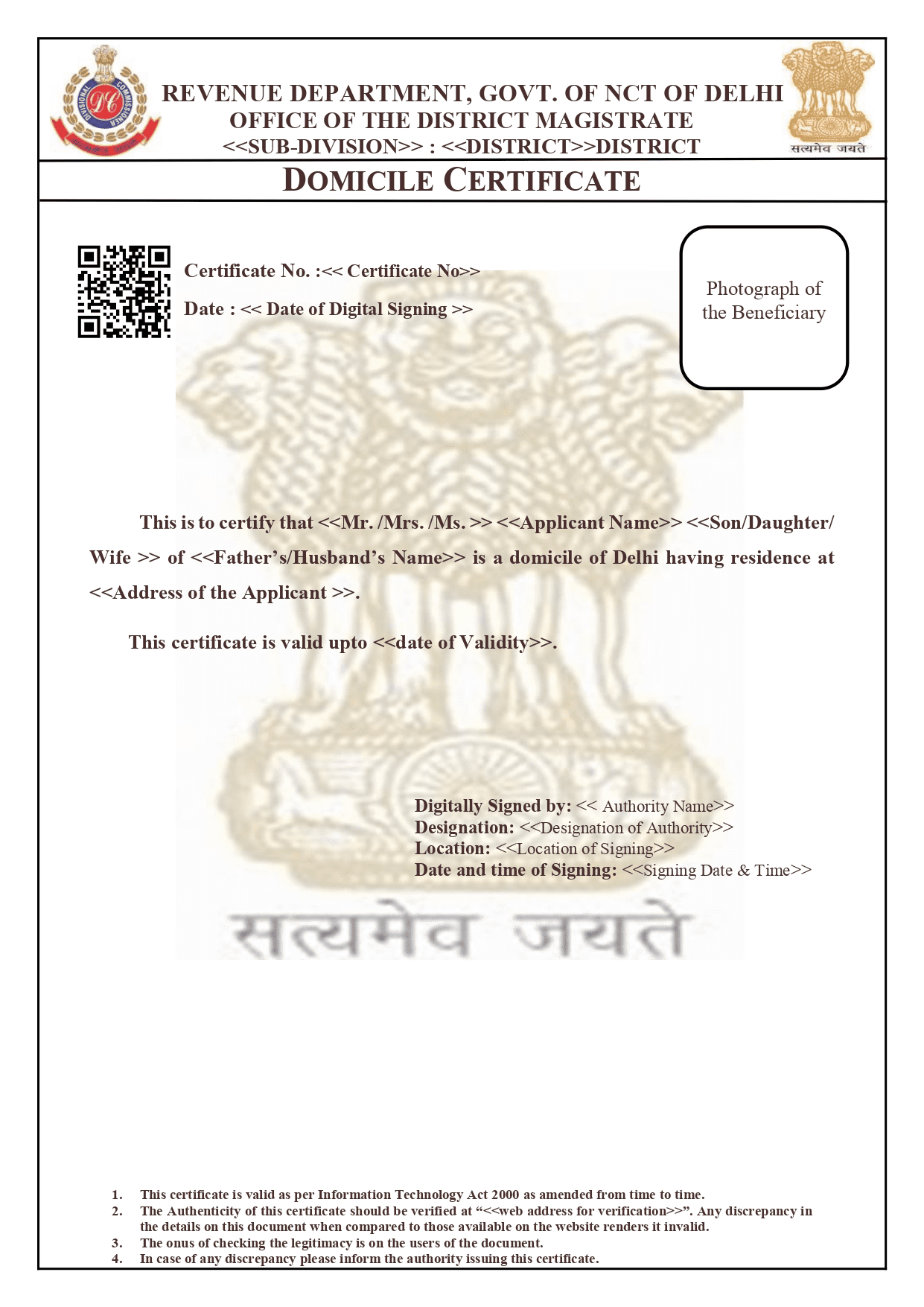
FAQs
Which document can be submitted as identity proof for a minor?
For a minor, a letter from the school principal on the school letter head would serve as identity proof. For children of five years, the birth certificate would act as ID proof.
Which authorities issue residence certificates?
Departments entrusted with this responsibility include gram panchayats/panchayat samitis, jila parishad, block, circle, nagar panchayat/nagar parishad/nagar nigam) and sub-divisions.
In which states can I apply for residence certificate online?
Following is the list of states where you can apply for residence certificate online: (1) Arunachal Pradesh (2) Assam (3) Bihar (4) Delhi (5) Jammu & Kashmir (6) Karnataka (7) Manipur (8) Maharashtra (9) Mizoram (10) Meghalaya (11) Telangana (12) Tripura
What is the fee to apply for a residence certificate?
Local authorities charge a token fee to issue a residence certificate in India. The fee can range between Rs 20 and Rs 50, depending on the state where you are applying. In Noida, an applicant should pay Rs 30 as the residence certificate fee. In Delhi, no fee is levied to issue this document.
How much time does it take to get a residence certificate?
The time to issue this certificate is different for various states. However, in most cases the timeline to issue the certificate is 20 days. In Delhi, the response time is 14 days. In Goa, the time taken to issue this document is five days.
What is the office time to apply for a residence certificate?
You can approach the SDM of your area or you can also approach the concerned O/o the deputy commissioner from 10 AM to 1 PM on any working day.
| Got any questions or point of view on our article? We would love to hear from you. Write to our Editor-in-Chief Jhumur Ghosh at jhumur.ghosh1@housing.com |

An alumna of the Indian Institute of Mass Communication, Dhenkanal, Sunita Mishra brings over 16 years of expertise to the fields of legal matters, financial insights, and property market trends. Recognised for her ability to elucidate complex topics, her articles serve as a go-to resource for home buyers navigating intricate subjects. Through her extensive career, she has been associated with esteemed organisations like the Financial Express, Hindustan Times, Network18, All India Radio, and Business Standard.
In addition to her professional accomplishments, Sunita holds an MA degree in Sanskrit, with a specialisation in Indian Philosophy, from Delhi University. Outside of her work schedule, she likes to unwind by practising Yoga, and pursues her passion for travel.
sunita.mishra@proptiger.com











